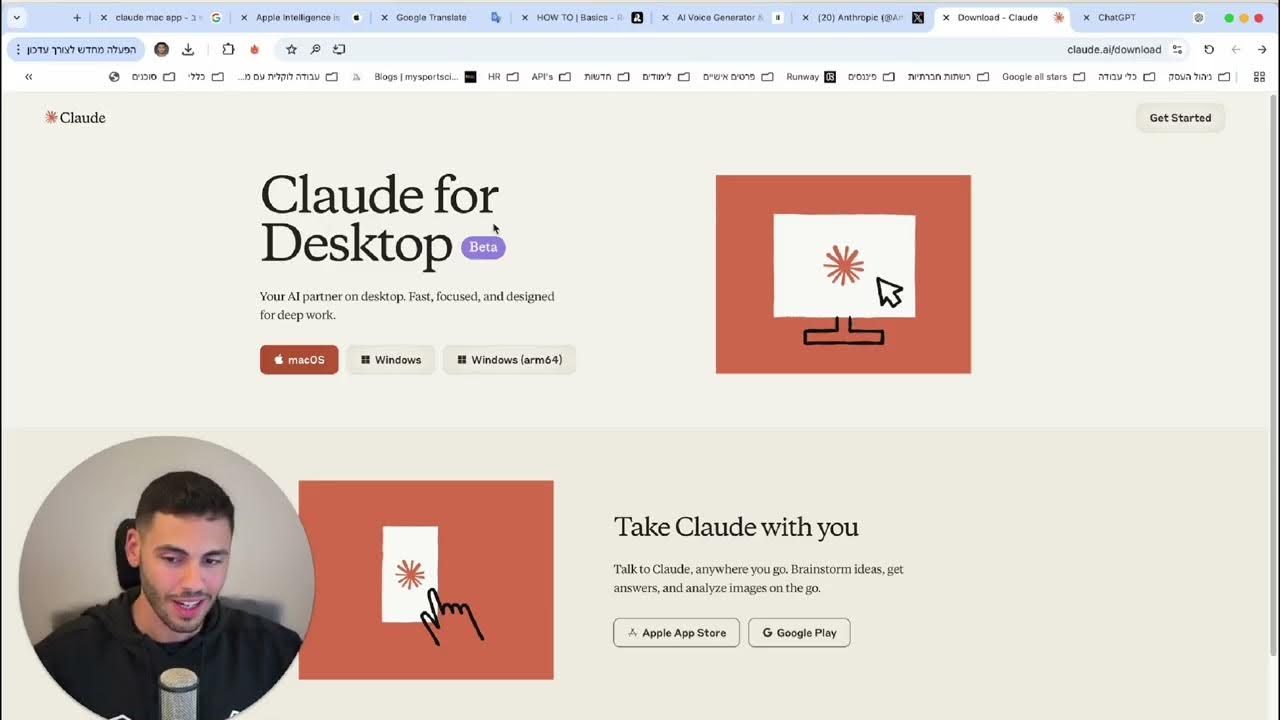Taking Claude to the Next Level
Summary
TLDRIn this presentation, Lisa Crowoot from Anthropic introduces the latest AI models, Claude 4 Opus and Sonnet, designed to enhance AI collaboration and independent task execution. Key advancements include Claude’s ability to alternate between thinking and tool use, improved memory for long-term tasks, better instruction-following, and reduced reward hacking. The models are optimized for complex, sustained projects, like coding and system refactoring. Practical tips for effective model use are also shared, emphasizing the importance of testing, prompt engineering, and adapting models for specific tasks. The focus is on building trust and enhancing agentic capabilities for diverse applications.
Takeaways
- 😀 Claude is designed to work alongside users and operate independently, adapting to different work styles and tasks over long durations.
- 😀 Claude 4 models, including Opus and Sonnet, have four main improvements: thinking and tool use, memory, complex instruction following, and reduced reward hacking.
- 😀 Claude can alternate between thinking and tool use, allowing it to analyze large datasets, plan tasks, and find patterns efficiently, like in the bike rental example.
- 😀 Memory is crucial for extended tasks; Claude Opus 4 can track long-term plans and remember essential facts, making it effective for sustained work over hours.
- 😀 In the Pokemon example, Claude Opus 4 showcases memory capabilities by tracking progress over extended gameplay, like keeping track of Pokemon battles and leveling up.
- 😀 Claude 4 is better at following complex instructions, even with long system prompts (over 10,000 tokens), and can steer its behavior more accurately.
- 😀 Reward hacking, where models take shortcuts to achieve results, has been significantly reduced in Claude 4, improving trust in its outputs.
- 😀 Opus 4 is ideal for complex, long-term tasks like coding in large codebases, migrations, or planning, while Sonnet 4 is faster and more efficient for more straightforward tasks.
- 😀 With Claude 4, prompts should be refined to reduce overeagerness, where models used to over-deliver, such as coding more than requested (e.g., designing a full app when only asked to change a button color).
- 😀 Claude 4 models can handle tool usage in parallel and make thoughtful decisions between tool calls, ensuring efficient multitasking and improved task execution.
- 😀 Feedback on the new models is encouraged, with open channels for direct communication with Anthropic employees, allowing for continuous improvement and adaptation of the models.
Q & A
What are the three main objectives Claude should excel at according to the speaker?
-Claude should be able to work alongside you and adapt to the ways you work, work independently on tasks requiring many steps, and sustain performance over long durations of continuous work.
What is the difference between Claude working collaboratively and independently?
-In collaborative mode, Claude works alongside the user, challenging assumptions and improving quality. In independent mode, Claude takes on tasks like code refactoring without tight human oversight, making decisions autonomously based on up-to-date information.
How does Claude handle long-term tasks without losing track of details?
-Claude utilizes memory to track important facts and progress, ensuring that it can complete long-term tasks without losing focus or missing critical details.
What new capability does Claude 4 introduce regarding thinking and tool use?
-Claude 4 can alternate between thinking and using tools, allowing it to analyze data autonomously, plan steps, and execute tasks in stages. For example, when analyzing a large dataset, it first thinks tactically, then uses tools to run code and analyze the data.
How does Claude’s memory capability contribute to its performance?
-Claude’s memory allows it to track tasks over hours or even days, remembering key details and progress. For example, in a Pokémon game simulation, Claude can remember and track its Pokémon’s training progress over numerous battles.
What is meant by ‘complex instruction following’ and how does Claude 4 improve in this area?
-Complex instruction following refers to Claude’s ability to process long and intricate sets of instructions. Claude 4 has been trained to handle system prompts with over 10,000 tokens, improving its ability to follow detailed instructions and enhancing steerability for developers.
What is ‘reward hacking’ and how does Claude 4 address this issue?
-Reward hacking refers to when models take shortcuts to achieve outcomes without solving the problem properly. Claude 4 shows over 80% less tendency towards reward hacking, ensuring more trustworthy and accurate task completion.
What guidance is given for selecting between Claude Opus and Claude Sonnet?
-Opus is best suited for complex and long-term tasks, like large code refactors or long horizon planning. Sonnet is faster and more efficient, ideal for tasks such as app development and coding generation when human involvement is needed.
What role does prompt engineering play in getting the best performance from Claude 4 models?
-Prompt engineering is crucial as small changes in the prompt can significantly impact Claude’s performance. For instance, removing language that dampens Claude’s tendency to go ‘above and beyond’ can enhance its effectiveness in certain tasks.
How does Claude 4 handle tool use differently from earlier versions?
-Claude 4 can now invoke tools in parallel, running multiple tasks simultaneously. It also allows users to specify when and when not to use tools, which helps prevent over-triggering and ensures the tool is used effectively.
Outlines

هذا القسم متوفر فقط للمشتركين. يرجى الترقية للوصول إلى هذه الميزة.
قم بالترقية الآنMindmap

هذا القسم متوفر فقط للمشتركين. يرجى الترقية للوصول إلى هذه الميزة.
قم بالترقية الآنKeywords

هذا القسم متوفر فقط للمشتركين. يرجى الترقية للوصول إلى هذه الميزة.
قم بالترقية الآنHighlights

هذا القسم متوفر فقط للمشتركين. يرجى الترقية للوصول إلى هذه الميزة.
قم بالترقية الآنTranscripts

هذا القسم متوفر فقط للمشتركين. يرجى الترقية للوصول إلى هذه الميزة.
قم بالترقية الآنتصفح المزيد من مقاطع الفيديو ذات الصلة

ChatGPT Is OLD NEWS After Seeing This Incredible AI!

L'inesplicabile utilità di Claude Sonnet, a prescindere da ciò che dicono i benchmark

3 Free AI Apps Better Than ChatGPT

Meet Claude 2 : Anthropic's NEXT GEN Supercharged Model

צ׳אט GPT או קלוד? כל מה שחדש בעולם ה-AI השבוע!

Claude 3 meglio di Chat GPT4 e Gemini! 🤯 Guida per utilizzare Claude 3 OPUS GRATIS [ita]
5.0 / 5 (0 votes)
